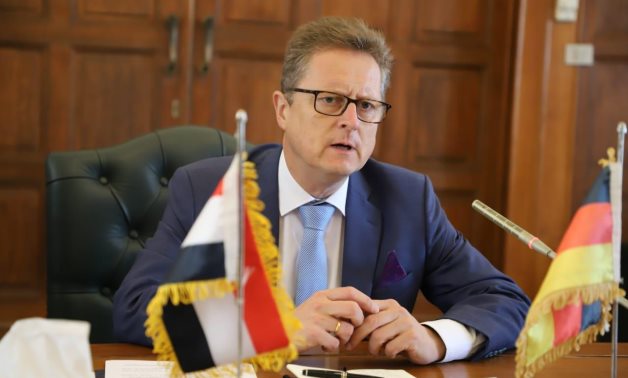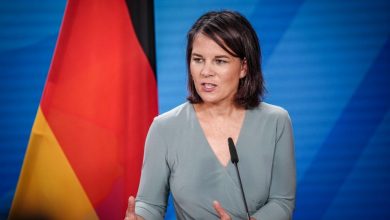
|
|
There i |
| Germany supports many environmentally friendly projects in Egypt; Can you give us examples of that? |
| -For many years, sustainability and the environment have played a major role in German-Egyptian cooperation. Together with our hardworking Egyptian partners on the ground and through our two implementing organizations, GIZ and KFW, we have achieved many projects ranging from hydroelectric power plants, solar and wind energy to waste management and irrigation. For example, German-Egyptian cooperation in the field of renewable energies helps reduce carbon dioxide emissions by 2 million tons annually. The overall objective of these projects is to achieve sustainable progress and improve people’s living conditions. Moreover, many German companies specializing in environmentally friendly solutions and future-oriented technologies have great interest in further energy cooperation, as evidenced by plans to explore green hydrogen. However, combating climate change is not only a task of development and economic cooperation, but also of civil society. This is the area in which our partners in the German Academic Exchange Service (DAAD), the Goethe-Institut and our political institutions cooperate with many Egyptian NGOs. By establishing the “Cairo Climate Talks Forum”, we have created a unique platform for exchanging experiences, raising awareness and promoting collaboration between policy makers, business, scholars and civil society. |
| How can Egypt and Germany cooperate to make COP27 a success? The Russian invasion of Ukraine and its repercussions are at the top of the global agenda. How can Egypt and global partners work to ensure that climate change and COP27 receive due attention? |
| Climate change represents the greatest security threat of our time. It requires immediate and joint action at the global level, and this is where the importance of COP27 emerges, as a stage to reach an urgent roadmap, and that is why we all have to give the conference due attention. Unfortunately, Russia’s aggressive war against Ukraine, which has flagrantly violated international law, has enormous repercussions not only for international security, financial markets and food security, but also for all of our efforts to combat climate change. Moscow’s use of food and energy as weapons in its hybrid warfare has caused a global crisis that has exacerbated many existing problems in different countries around the world. Dealing with this situation makes it difficult to mobilize the international resources we urgently need in our common fight against climate change. On the other hand, this global shock may also amplify the wake-up call for countries, and thus motivate them to accelerate the development of ambitious plans to confront climate change. In Germany, we painfully realized what dependence on fossil fuels has brought us; So the issue of the energy transition has become more pressing and our will to speed up this process is stronger than ever. |
| How can developed countries fulfill their previous commitments to help developing countries, especially in Africa, to confront and mitigate climate change? |
| The climate crisis is a global threat that does not stop at borders. It affects each of us. However, industrialized nations such as Germany have a special responsibility to countries that are particularly affected by the consequences of climate change even though they are not among the major emitters. Against this background, the importance of green modernization emerges, as Germany supports Egypt and other countries in their efforts to expand renewable energies and achieve sustainable economic growth and social progress. At the same time, we remain committed to promoting ambitious climate protection at the global political level. We are also ready to meet our share, and this willingness has financial evidence. Germany increased its climate financing more than tenfold between 2005 and 2020. |
| How can addressing climate change provide economic opportunities (such as green hydrogen), and will this motivate capital to invest in green projects? |
| Climate change and its effects become more visible every year, from floods to droughts and the loss of fertile land. These phenomena not only reveal the vulnerability of our environment and the increasing threat to our livelihood, but also a security factor, as climate-related shocks act as catalysts for conflict around the world. Therefore, investing in green energy and eco-friendly projects is not a matter of catalyst – it is an obligatory response that has no alternative. In Europe, we have just discovered the vulnerability of fossil fuel dependence. Russia’s aggressive war in Ukraine and Moscow’s manipulation of energy and gas have caused a major energy crisis. In the long term, green energy is the only way to achieve independence, stability and security, both at the political level and at the climate level. So we are moving forward at full speed towards the energy transition and the development of new sustainable technologies such as green hydrogen. |
 s no doubt that hosting an event like COP27 is a daunting task that requires huge efforts on many levels, including the level of economic, societal and political coordination. During my conversations with Egyptian partners, I got the impression that this conference is a top priority for the Egyptian government and that everyone is working tirelessly to make sure things run smoothly. Also, COP27 comes at a critical time as the impact of climate change is becoming increasingly visible around the world. Hence, if we are to have a chance to limit these dramatic effects and reduce global warming to 1.5 degrees, we need immediate joint action. This includes, of course, significant contributions to climate finance and climate adaptation funds. However, money alone will not be enough to stop climate change, as the international community must take concrete steps towards an ambitious green transformation. Critical national action plans are needed as well as close exchanges between policy makers, civil society, economic actors and scholars.
s no doubt that hosting an event like COP27 is a daunting task that requires huge efforts on many levels, including the level of economic, societal and political coordination. During my conversations with Egyptian partners, I got the impression that this conference is a top priority for the Egyptian government and that everyone is working tirelessly to make sure things run smoothly. Also, COP27 comes at a critical time as the impact of climate change is becoming increasingly visible around the world. Hence, if we are to have a chance to limit these dramatic effects and reduce global warming to 1.5 degrees, we need immediate joint action. This includes, of course, significant contributions to climate finance and climate adaptation funds. However, money alone will not be enough to stop climate change, as the international community must take concrete steps towards an ambitious green transformation. Critical national action plans are needed as well as close exchanges between policy makers, civil society, economic actors and scholars.


